
A well-established retail brand that’s been around for decades is facing a new challenge.
Despite its long history and loyal customer base, growth has plateaued.
The flashy paid ads that once brought in a steady stream of new customers no longer deliver the same results.
With competitors adopting digital-first strategies, the brand finds itself at a crossroads.
How can it reignite growth and remain relevant without pouring endless resources into paid marketing?
The answer lies in organic marketing.
By shifting focus to sustainable strategies – like creating valuable content, optimizing for search engines, and building meaningful relationships with customers – the brand can drive long-term growth that doesn’t rely on paid marketing tactics.
In this blog, we’ll dive into how organic marketing can help businesses like this one achieve sustainable, long-term success.
What is Organic Marketing?
Organic marketing refers to the process of attracting and engaging customers naturally over time without relying on paid advertising/marketing.
It focuses on building genuine connections, providing valuable content, and nurturing long-term relationships with your audience.
Unlike paid marketing, where businesses invest in ads to get quick results, organic marketing takes a more sustainable approach by prioritizing strategies that create lasting value.
Organic marketing includes a wide range of activities such as SEO, content marketing, social media engagement, email marketing, and more.
The goal is to grow your brand’s visibility and reputation through authentic interactions, helping you establish trust and authority in your industry.
Ultimately, organic marketing is about delivering consistent value to your audience, which leads to sustainable, long-term growth.
It might take time to see the results, but when done right, it becomes a powerful strategy for building customer loyalty and generating steady business without the need for constant ad spend.
Difference Between Organic Marketing and Paid Marketing
Imagine two businesses (say a boutique hotel and a homestay) trying to boost their online presence. The first decides to go the paid marketing route.
They launch a series of targeted ads on social media and search engines, gaining instant visibility.
Traffic spikes, sales come in, and it feels like a win. But as soon as the ad budget runs dry, the traffic slows, and sales decline.
Paid marketing delivered quick results, but only as long as money kept flowing into the campaigns.
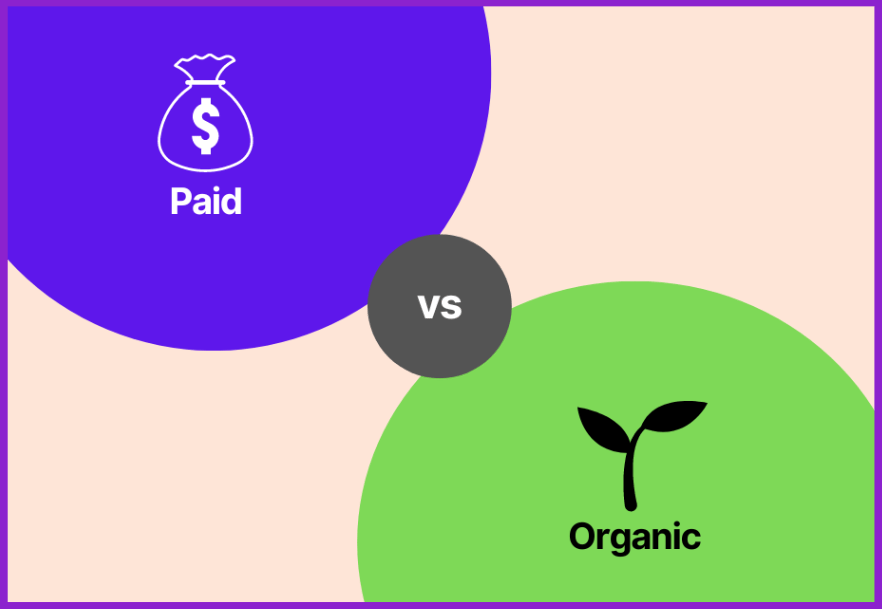
Now, the second business takes a different approach organic marketing.
Instead of paying for quick traffic, they invest time in creating high-quality blog posts, optimizing their website for search engines, and regularly engaging with their audience on social media.
The growth is slower at first, but over time, their blog begins ranking for important keywords, their social media following grows, and they build a loyal customer base.
And the best part?
The results stick. Even when they pause active efforts, the foundation they’ve built continues to bring in visitors, leads, and sales.
This is the fundamental difference between organic and paid marketing.
Paid marketing offers fast, immediate results but is temporary and reliant on a constant budget.
Organic marketing, on the other hand, is slower to show results but creates sustainable, long-term growth that doesn’t disappear when the spending stops.
Both have their place, but organic marketing focuses on building lasting value that pays off in the long run.
How Organic Marketing Creates Sustainable and Long-Term Growth for Your Business?
Think of organic marketing like planting a tree.
In the beginning, you start with a small sapling, carefully nurturing it with sunlight, water, and patience.
Growth is slow, and you might not notice much change day-to-day. But as time passes, the tree’s roots grow deeper, its trunk gets stronger, and it begins to flourish, providing shade, beauty, and even fruit year after year.
And the best part?
Once the tree is established, it continues to grow and thrive with less and less maintenance.
In the same way, organic marketing starts with small, deliberate actions: creating valuable content, building relationships with customers, and optimizing your website for search engines.
At first, you may not see immediate results, but over time, these efforts compound.
As your content gains traction and your audience grows, you’ll find that the impact of your organic marketing deepens.
According to Meltwater’s Digital 2024 Global Overview Report, there are top 6 most-visited online channels that marketers can leverage to push out their organic campaigns.
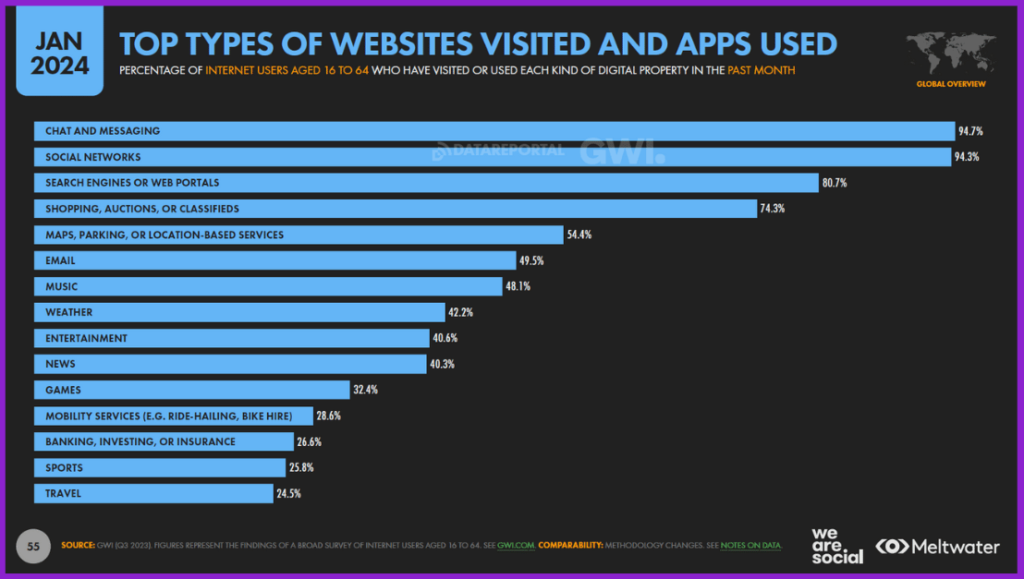
Customers begin to trust your brand, visit your website regularly, and recommend you to others.
This steady, compounding growth is what makes organic marketing so powerful.
It allows your business to build a strong foundation that will continue to provide returns long after your initial efforts.
Unlike the fleeting results of paid campaigns, organic marketing creates sustainable, long-term growth that’s here to stay.
12 Key Organic Marketing Strategies for Sustainable and Long-Term Business Growth
Organic marketing is built on a range of strategies that, together, create a powerful ecosystem for your brand’s growth.
Here are some essential strategies that drive sustainable, long-term results:
1. Search Engine Optimization (SEO)
At the heart of organic marketing, SEO allows you to attract consistent, targeted traffic to your website.
Diversify your SEO efforts to other search engines like Bing, Yahoo, DuckDuckGo, Yandex, and AI-based search platforms (like ChatGPT, Perplexity, etc).
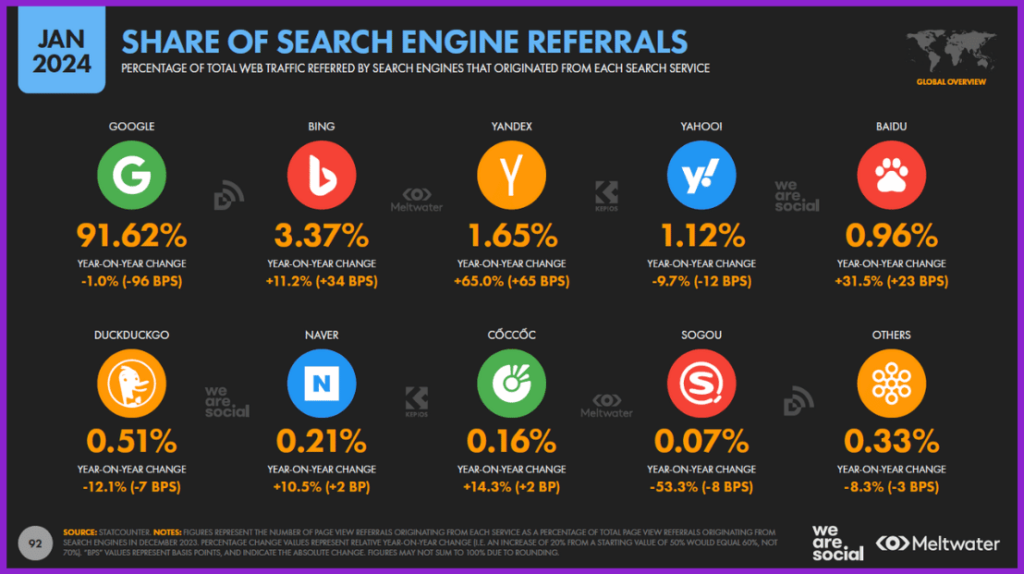
By optimizing for relevant keywords and improving your site’s user experience, you can rank higher in search results, making it easier for potential customers to find you.
Over time, your SEO efforts help build a reliable stream of organic visitors that keep coming back and also helps in building brand awareness via search engine results.
2. Content Marketing
At the core of organic marketing, content marketing involves creating valuable, relevant, and consistent content that speaks directly to your audience’s needs and interests.
Whether through blogs, videos, infographics, or social media posts, content marketing establishes your brand as a trusted resource.
By delivering valuable insights and solutions, you can attract a steady stream of potential customers and keep them engaged over time, building a loyal following that relies on your brand for knowledge and inspiration.
3. Content Repurposing
One piece of content can do more than you think.
By repurposing your content into different formats – like turning a blog post into a video, a carousel, or even a podcast episode – you can reach new audiences without starting from scratch every time.
If you are facing the challenge of finding ideas for new content then content repurposing can fill that gap.

Repurposing also extends the life of your content, ensuring it remains valuable and relevant across multiple platforms.
4. User-Generated Content (UGC)
Customers love to share their experiences. By encouraging and leveraging UGC, you can build trust and authenticity around your brand.
UGC not only amplifies your message but also fosters a sense of community as your customers become advocates, sharing their stories and experiences with your products.
5. Moment Marketing
Engaging with your audience during trending moments and events allows you to stay relevant and connect on a personal level.
Moment marketing makes your brand timely and relatable, which is essential for building lasting relationships with your audience.
It’s a quick, engaging way to show you’re in touch with what’s happening in your customers’ world.
6. Email Marketing
With email, you can cultivate a direct line to your audience.
By delivering valuable content and updates to your subscribers, you stay top of mind and build lasting relationships.
A well-executed email marketing strategy keeps your audience engaged, informed, and loyal to your brand over the long term.
7. Employee Advocacy
Employees can be some of your best brand advocates.
By empowering them to share content, insights, and experiences related to your brand, you extend your organic reach and build trust.
Employee advocacy adds a personal touch and authentic voice to your marketing, which can help create a more relatable brand image.
8. YouTube Marketing
YouTube allows you to educate, entertain, and engage with your audience in a highly visual way.
Creating content that addresses your audience’s interests and needs can position your brand as a go-to resource over time.
With a solid YouTube marketing strategy, your videos can continue to attract views and engagement long after they’re published.
9. WhatsApp Marketing
WhatsApp offers a direct, personal way to communicate with customers.
Also, WhatsApp is the most used social media app daily by internet users, according to Meltwater’s 2024 Global Digital Report.
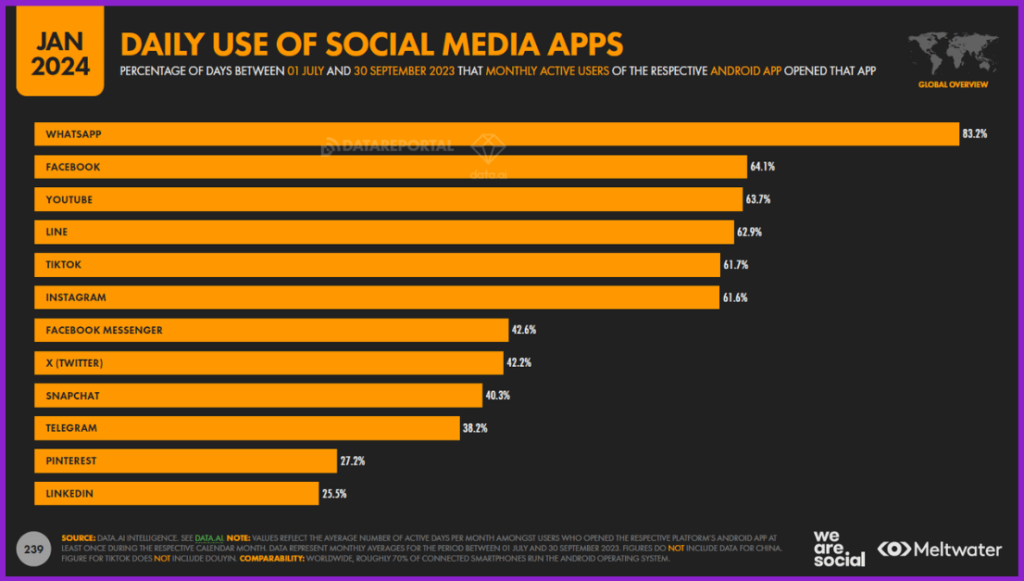
It’s particularly effective for providing real-time updates, personalized offers, and building a community through group chats.
By fostering these one-on-one interactions, you create a sense of exclusivity and build long-term loyalty.
Check out this article to know more about WhatsApp marketing and how your business can leverage it.
10. Nano-Influencer Collaboration
Nano-influencers may have smaller followings, but they often have highly engaged audiences.
Collaborating with them allows you to tap into niche markets and build trust among their followers.
These influencers bring authenticity and personalized recommendations that resonate well, especially in communities that value genuine connections.
11. Referral Marketing
Harness the power of word-of-mouth with referral marketing.
By encouraging satisfied customers to refer your brand to their friends, family, or colleagues, you can create a ripple effect that expands your reach organically.
Referral programs often reward both the referrer and the new customer, making it a win-win for everyone involved.
This strategy leverages the trust people have in personal recommendations, which can be incredibly effective for long-term growth.
12. Social Media Marketing
Social media platforms offer powerful channels for organic marketing, allowing you to connect with your audience in real-time, share valuable content, and build a community around your brand.
By regularly posting engaging, informative, and interactive content, you can foster relationships, and spark conversations. Also, regularly engage with posts created by others who you deem relevant to your niche.
Social media also enables you to respond directly to customers, humanizing your brand and building trust.
According to Meltwater’s Digital 2024 Global Overview Report, internet users prefer social media networks (after search engines) when it comes to researching brands online.
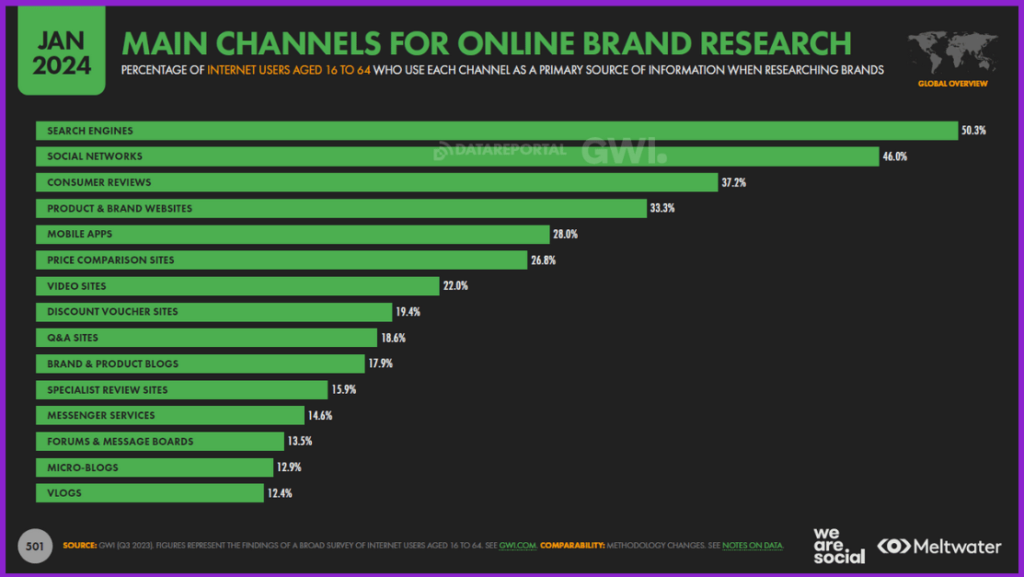
Over time, a strong social media presence helps increase brand awareness, attract loyal followers, and drive sustainable growth as your content gets shared and recommended by your audience.
For instance, X (Twitter), Reddit, and Instagram Reels are great social media platforms to build brand awareness for your business.
How to Track and Measure the Effectiveness of Organic Marketing Campaigns Over Time
Tracking the performance of organic marketing strategies is essential to understand what’s working and where you can improve.
While organic efforts often take time to show results, here are some practical tips for monitoring their effectiveness over the long term:
1. Monitor Website Traffic and Engagement with Analytics Tools
Use tools like Google Analytics to track key metrics, such as organic traffic, bounce rate, and average session duration.
These insights can show how visitors are finding your content, which pages are most popular, and how engaged your audience is over time.
2. Track SEO Metrics Regularly
Keep an eye on keyword rankings, backlinks, and organic search traffic to measure the impact of your SEO efforts.

Tools like Google Search Console, HubSpot, Ahrefs, or Semrush can provide valuable data on your site’s visibility, helping you refine your strategies and monitor improvements in search rankings.
3. Measure Social Media Engagement
Track metrics such as likes, shares, comments, and follower growth on social media platforms.
This will help you see which content resonates with your audience and identify engagement trends. Additionally, monitoring mentions and tags can give you insight into brand perception and reach.
4. Evaluate Email Marketing Performance
Measure open rates, click-through rates, and conversion rates for your email campaigns.
Tracking these metrics over time will reveal the types of content that engage your subscribers and lead to conversions, helping you adjust your email strategy accordingly.
5. Analyze Content Performance Across Platforms
Use content performance metrics such as page views, time on page, and social shares to gauge the success of blog posts, videos, and other content types.
Review these metrics periodically to identify topics that attract the most interest and encourage the highest engagement.
6. Gather Customer Feedback and Testimonials
Engage with your audience directly to get qualitative feedback on their experience with your brand. Conduct surveys, encourage testimonials, and monitor reviews.

These insights offer a unique perspective on the impact of your organic marketing efforts and help identify areas for improvement.
7. Track Performance of Referral Campaigns
Use unique referral links or codes to monitor which customers are driving new leads or sales through word-of-mouth.
Most website analytics tools, like Google Analytics, allow you to set up tracking for these campaigns, enabling you to see the specific sources of referral traffic.
Additionally, if you’re running a formal referral program, you can use software like ReferralCandy or Referral Rock to automate tracking.
By measuring metrics such as referral clicks, sign-ups, and conversions, you can evaluate the effectiveness of your referral campaigns and adjust incentives as needed to boost engagement.
Final Thoughts
Organic marketing may take time and patience, but the results are well worth the effort.
By focusing on strategies that build trust, foster genuine connections, and deliver long-lasting value, you create a strong foundation for sustainable growth.
As you invest in these tactics, track your progress, and refine your approach, you’ll cultivate a loyal audience and position your brand for success – without relying on constant ad spend.
Embrace organic marketing, and watch your business grow steadily, one meaningful interaction at a time.

Organic marketing focuses on growing your audience naturally through valuable content, SEO, social media engagement, and community building. Instead of relying on paid ads, this strategy emphasizes authentic connections, helping businesses build trust, improve brand awareness, and drive sustainable long-term growth. By consistently delivering high-quality content, engaging with audiences, and optimizing for search engines, brands can attract and retain customers without heavy advertising costs.
Hi,
Thanks for sharing your thoughts.